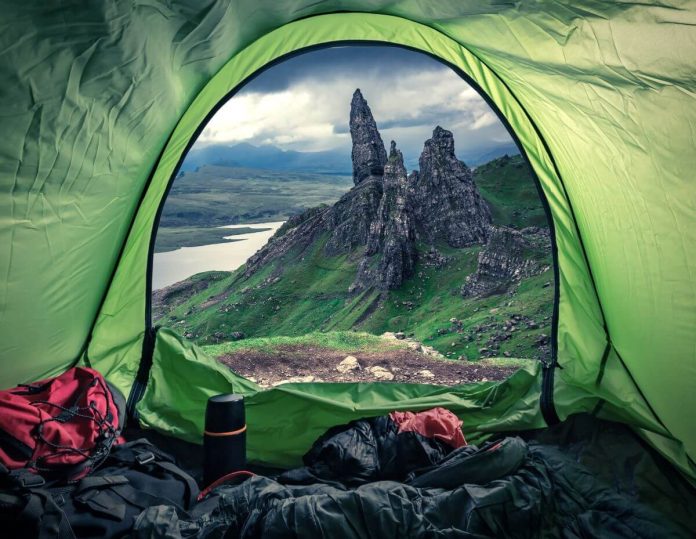
Contents
Last Updated on 27th July 2024
Wild camping, the practice of setting up a temporary campsite away from designated areas, offers a unique way to immerse oneself in the natural landscapes of the UK.
From the rugged highlands of Scotland to the tranquil countryside of England, wild camping allows adventurers to experience the great outdoors up close and personal, warts and all.
There is no better way to go off grid and reconnect with nature to escape the stresses of modern life than camping. It allows you to immerse yourself in Mother Nature and go back to basics, but you cannot just pitch your tent anywhere.
This post will tell you all you need to know about wild camping in the UK so that you can enjoy the benefits of a camping trip without worrying about the law.
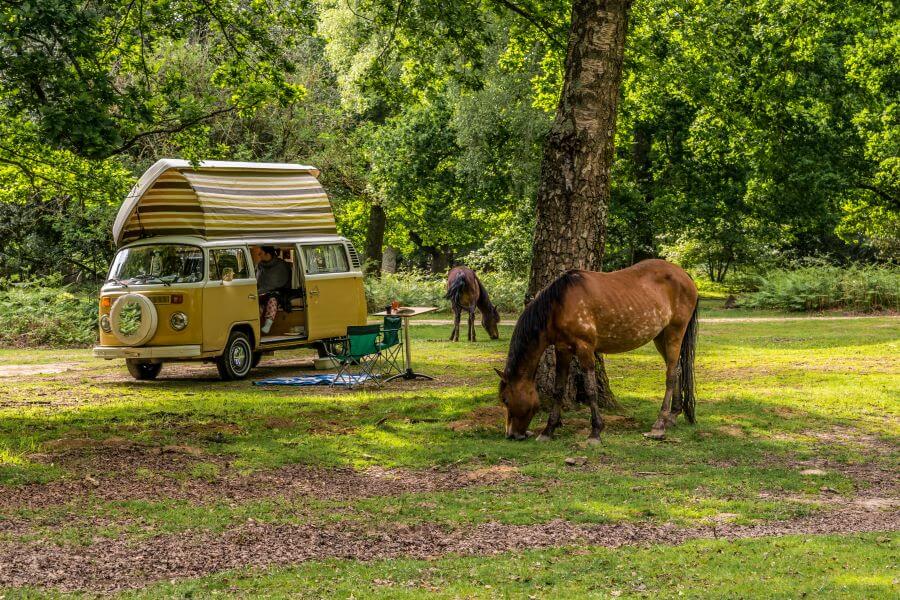
Understanding the Legal Landscape
Wild camping involves setting up camp in an area outside of a designated campsite or caravan park, but the legality of this can vary depending on where you are. And you must research these areas before you get there to, and also research fishing permits, etc.
Now technically you might be reading this thinking about stealth camping (where the intention is to stay undetected and have not sought permission), the police will just ask you to move on with penalties and fines only if you fail to do so. But lets be clear, on private land and the owner might take exception. Also, the field you are in might be used for livestock, pheasant shooting, farming, etc and accidents can happen if they don’t know you are there.
Overview of Wild Camping Across the UK Regions
Wild camping rules vary across the UK:
- Scotland: Known for its liberal wild camping laws under the Land Reform Act and the Scottish Outdoor Access Code, Scotland permits camping in tents on most unenclosed land only for campers who arrive on foot, by boat, or by bike. But things are changing and Camping Management Byelaws cover popular lochshore areas of the Loch Lomond National Park from 1st March to 30th September every year, where a permit is needed in Camping Management Zones. Camping permits may expand to other areas in Scotland, so confirm before you go.
- England, Wales, and Northern Ireland: Here, wild camping is generally restricted with landowner’s consent required, except in some national parks like Dartmoor where it’s tacitly allowed in certain areas, and Eiryi (Snowdonia).
If you are camping in a motorhome, some areas may have regulations in terms of overnight parking. You will also want to make sure you have proper motorhome insurance when exploring remote areas as the road surface might be uneven or have deep pot holes.
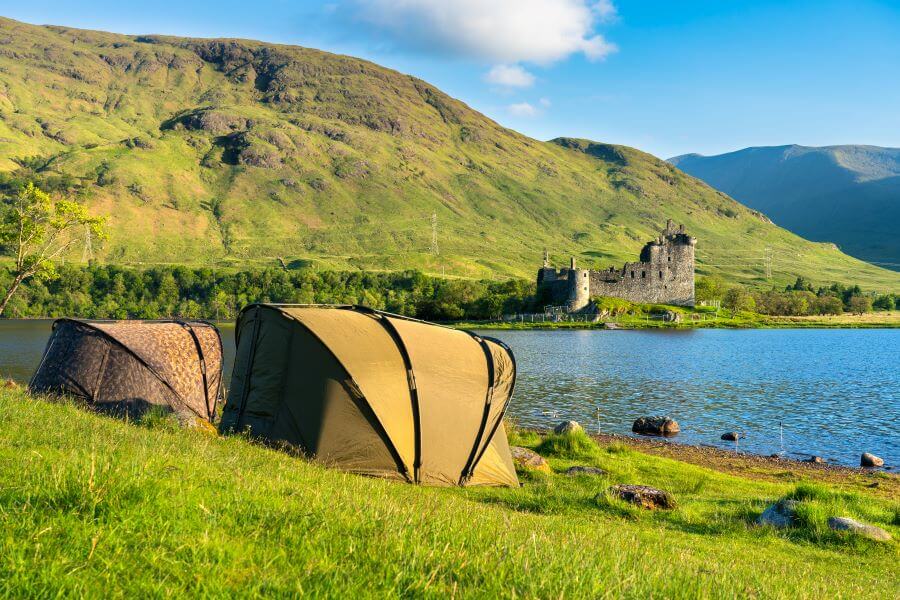
Leave No Trace Principles
In addition to making sure that you are allowed to set up camp, you must also embrace the Leave No Trace Principles. These are guidelines designed to minimise the environmental impact of wild camping and help to preserve the natural area. The principles are:
- Plan ahead and prepare
- Travel and camp on durable surfaces
- Dispose of waste, rubbish and litter properly
- Leave what you find from the natural world
- Minimise campfire impact
- Respect wildlife
- Be considerate of others
It is crucial to adhere to these, ensuring you leave the environment as you found it or better. This includes packing out all your waste, being cautious about where you relieve yourself, and respecting the local wildlife and flora.
Setting Up Camp
Choose a site at a reasonable distance from trails and water sources to minimise environmental impact, avoiding protected areas. You might see obvious signs of camping spots, but always try to seek permission before setting up.
Be mindful of fire regulations, portable stoves over open fires is always safer, but at minimum ensure it’s on open ground. In coastal areas, the beach is a good option to avoid lighting the vegetation.
Part of wildlife protection is to not leave food out overnight which is not part of their natural diet.
Wild Camping Etiquette
Maintain a low profile to ensure the tranquillity of the wilderness areas for everyone. Keep noise to a minimum and be considerate of other campers and the local community. Don’t set up in a farmers crops.
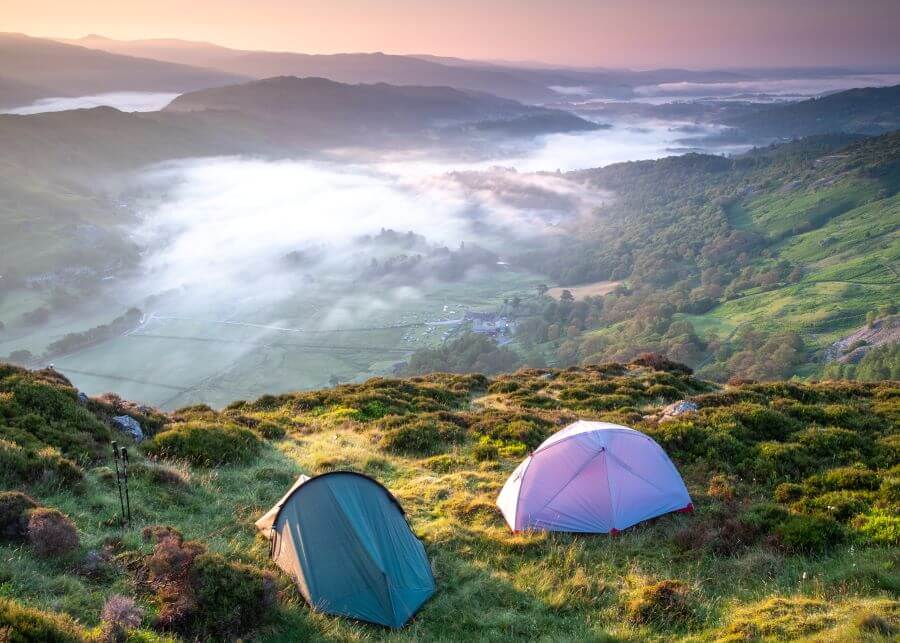
Essential Gear & Safety Considerations
Before heading off on your outdoor adventure, you need to make sure that you have high-quality gear and consider safety. A few key items you will need beyond camping equipment include:
Essential Gear
- Tents: Opt for a lightweight and durable tent that can handle wind and rain but isn’t that heavy to carry. A bivvy bag is an option for solo travellers, as it is basically a sleeping bag/shelter in one.
- Sleeping Bags: Ensure they are suitable for the seasonal temperatures you anticipate.
- Camping Stove (and other portable cooking equipment): Necessary for cooking in remote areas.
- Backpacks: Should be capacious yet comfortable to carry over long distances, padded straps and weight balance techniques will help.
- Raincoat: It is Great Britain after all, so weather-appropriate clothing is a must.
- Spare clothing: In a bag to stay dry, including extra socks. Also useful for temperature extremes.
- Emergency provisions: including dry food or energy bars and plenty of water.
- First aid kit: Plasters, bandages, antihistamines, etc. Sun cream and insect repellent are also useful.
- Walking boots: Even if not planning on hiking as you will still need to walk from your car.
- Binoculars: For birdwatching.
- Emergency Beacons: Particularly useful for lone travellers. It’s a small, hand-held device which can send out an SOS signal in the event of an accident.
- Navigation Tools (Maps, GPS): To help you navigate and not get lost.
In terms of safety considerations, you should always let people know where you are camping, have a means of communication (although it’s unlikely you will have phone signal), and be aware of difficult terrain and challenging weather conditions (always keep an eye on the forecast and be aware that mountains can have their own climate). It is also important to know how to administer first-aid in case there is an injury.
Also, if you plan on practising survival skills and bushcraft by foraging, make sure you have a good handbook and guide because there are poisonous plants and berries that grow in the UK.
Also, top tip. If you plan to drink from natural sources, check up-stream for any animal carcases first.
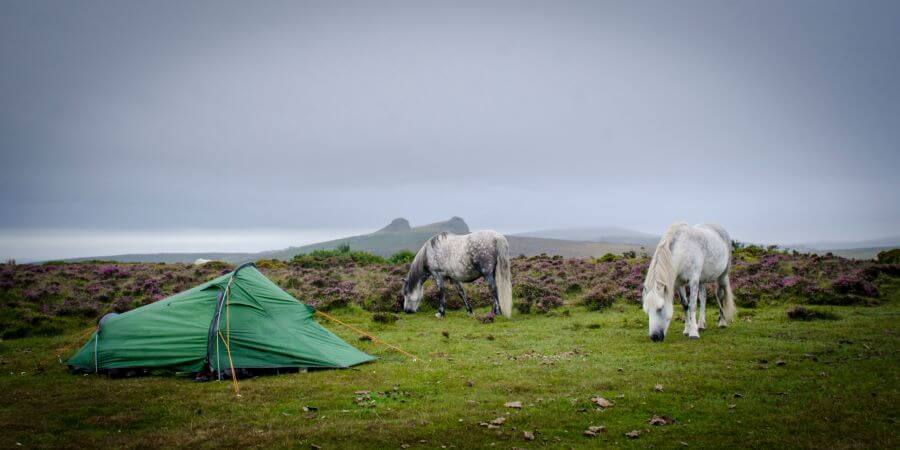
Wild camping can be a great way to have an outdoor adventure, reconnect with nature, and escape the stresses of fast-paced modern life. It’s a wonderful opportunity for freedom and backpacking exploration, and off-grid stargazing is always much better without light pollution.
While there is a lot to enjoy about wild camping experiences, you must also prepare for these trips as there are challenges involved. It’s not a bad idea to aware of nearby campsites if run out of daylight trying to find a suitable spot.
Just make sure that you are abiding by the law and allowed to set up camp in your chosen area with landowner consent. You must then adopt the Leave No Trace Principles and make sure that you have everything you need for a safe and comfortable camping experience.
Additional Resources
For further information, consult books and websites dedicated to wild camping, and don’t hesitate to contact national park authorities or outdoor associations for advice and real-time information.
By adhering to this guide, you ensure a responsible and fulfilling wild camping experience in the UK, respecting both the natural world and fellow outdoor enthusiasts.

































